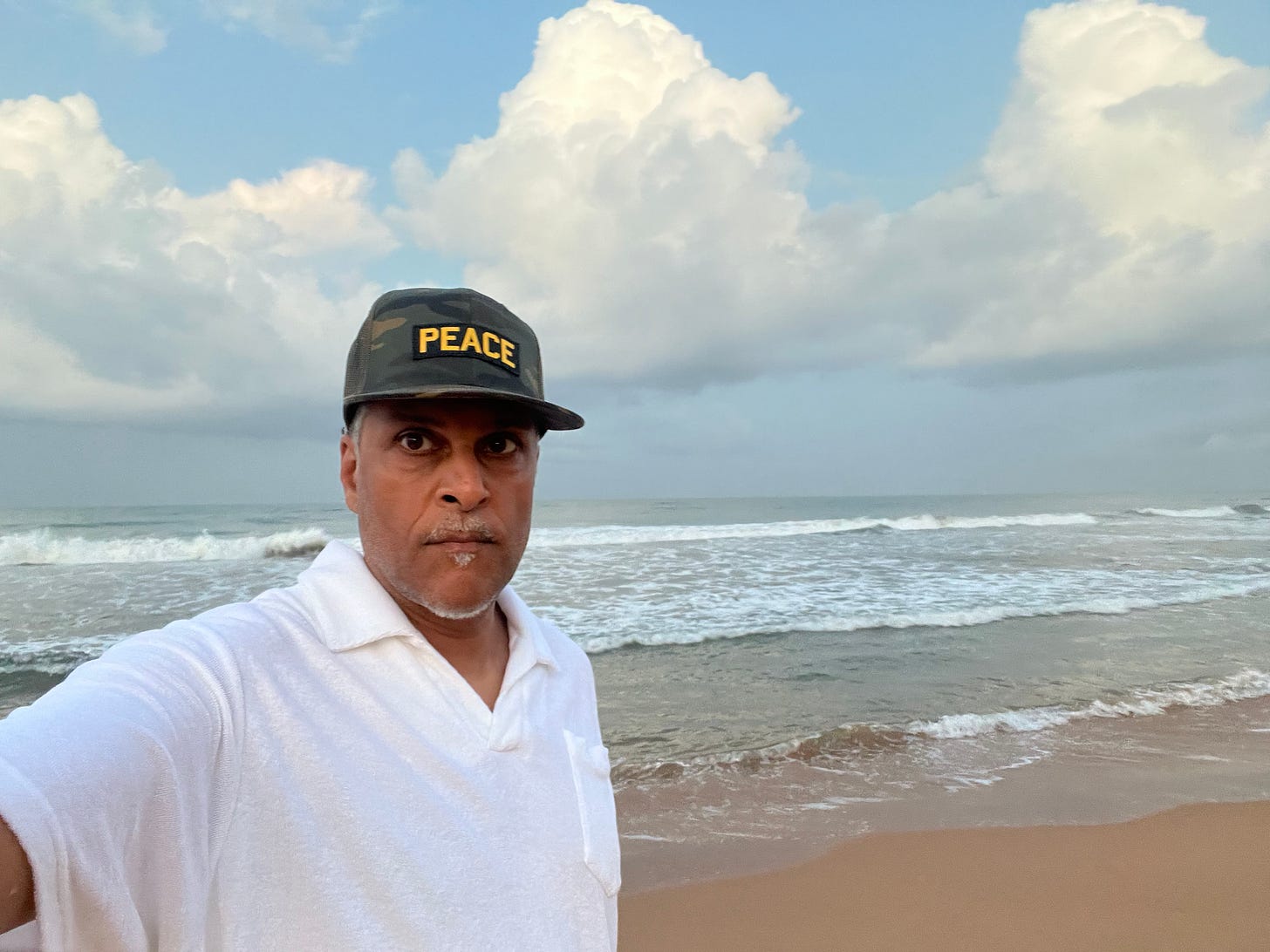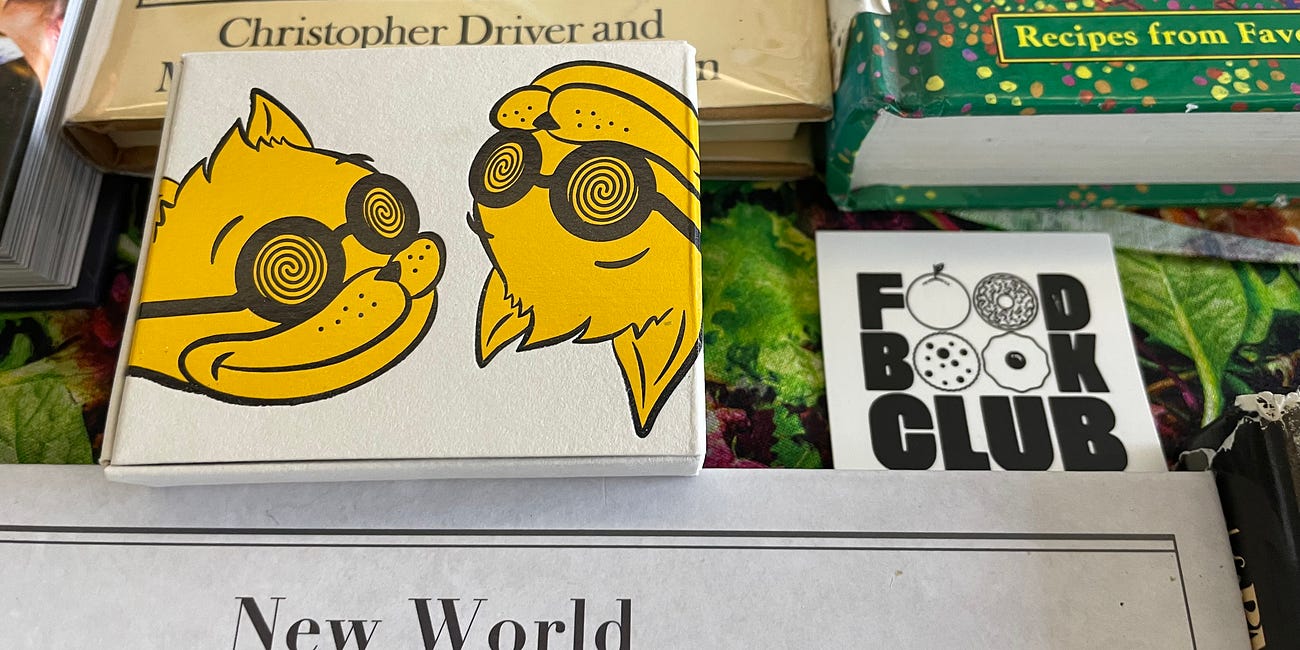Q+A: S.H. Fernando Jr. on Rice & Curry: Sri Lankan Home Cooking
See how this author helped introduce the cuisine to the world!
I’m excited to share this interview with my friend S.H. Fernando Jr., who recently released an updated edition of his cookbook Rice & Curry: Sri Lankan Home Cooking via Hippocrene Books.
The late legend Anthony Bourdain, who traveled to Sri Lanka with Fernando for an episode of No Reservations, called Rice & Curry “A terrific introduction to a great culinary tradition about which egregiously little is known. Well-researched, authentic, and easy-to-follow recipes.”
Fernando has written three important books about music as well: The New Beats, From the Streets of Shaolin: The Wu-Tang Saga and The Chronicles of DOOM: Unraveling Rap’s Masked Iconoclast. We discussed the latter in a Music Book Club event at Green Apple Books on the Park in San Francisco last November.
He also has a longtime record label called WordSound Recordings and releases music as Spectre. His most recent album is below, in case you want a soundtrack to reading his interview!
Tamara Palmer/Food Book Club: With three separate editions, Rice & Curry has had such a long life! Would you describe the journey of this book and how the new version improves on your past work?
S.H. Fernando Jr.: Rice & Curry is really a homage to the food I grew up eating as a second-generation immigrant from Sri Lanka. Even though I was born in the U.S., I was raised by a Sri Lankan mother (my dad died when she was 6 months pregnant with me), who, in addition to bestowing me with a lot of Eastern values (i.e. respect, hard work) gave me an appreciation of our food, which is called rice and curry. This was really the only connection I had to the culture of my motherland since I didn’t grow up speaking the language—Sinhalese.
Actually, I didn’t really appreciate this food until I went away to college and had to suffer under institutional fare. My older brother, who by that time had learned to cook Sri Lankan, taught me how to make chicken curry and I progressed from there, always hitting up him or my mom for tips when I was living on my own. So that’s the genesis of the idea for the book. Of course, it took much longer for me to really explore the cuisine in depth and really master it, but cooking has always been just another outlet of creativity for me, so I’ve always considered it fun. Plus, if you like to eat, you better know how to cook, right?
So, around 2006, I was tired of seeing Dubya’s face all over the place and I decided to skip town for a couple years, rent out my place in Baltimore, and move to Sri Lanka, where my mom had recently bought a retirement condo. I have a huge extended family there of aunts and cousins, so I knew I wouldn’t be alone. And I decided to dedicate myself to really learning Sri Lankan cuisine from the ground up. Since so many spices are used, I had to learn about how each one was used; learn about how to shop for ingredients; learn different techniques like tempering, in which you fry up some onions, curry leaves and green chilies and maybe a little curry powder to add to a dish right before it is served to kind of boost the flavor.
I had my family in Sri Lanka to show me the ropes, especially my oldest Aunt, Dora, and her cook of 40 some years, Leela, both of whom have since passed away. So, it was a great year in which I totally dedicated myself to all aspects of Sri Lankan food and I really learned a lot. When I returned to the States a year later, I self-published Rice & Curry: Sri Lankan Home Cooking, even laying it out myself. Before I left, a friend of mine from NYC, who is a professional photographer, had come out to take photos, but since she was only there for a week, I had to arrange with a local restaurant to take pictures of their food. So, none of the photos in the self-published edition were of my own food.
Self-portrait by the author
I used those same photos when I shopped the book to Hippocrene Books in New York, who gave me a contract. That 1st published edition came out at the end of 2011 and became a New York Times notable cookbook. But I was still not comfortable about the fact that none of the photos were my food. So when Hippocrene gave me a chance to do an updated version, in which I also tweaked all the recipes and added some new ones, I wanted to redo all the photos. I got the original photographer, Susan Now, to come back to Sri Lanka with me for a month and reshoot pretty much all the dishes, that I cooked myself this time. This would be the most recent edition that just came out in 2024, of which I am really proud.
When you are developing recipes, how do you know when a dish is ready for the world?
With the initial cookbook, Sri Lankan home cooks don’t measure ingredients, so I had to really develop my own recipes for every dish. It just become a matter of trial and error, where you cook a dish many times until you get it right. Luckily, during that year in Sri Lanka, I had my whole family to judge the dishes. I would cook several dishes in the morning and take them to various aunts for lunch and then listen to their criticism. Like, “Oh, this needs more of this. And did you make sure to add this?” But being there, and eating out and eating at people’s houses I knew how things were supposed to taste as well. When I left at the end of the year, I had about 20 family members over to the apartment for lunch and I cooked a staggering amount of food. Everyone really enjoyed everything, so I knew I was ready for the world then.
Do you see parallels between cooking and creating music?
That’s a great question, and I sure do! Being a label owner and producer myself, I know that all my musician friends love food and love to eat. In fact, going on tour in Europe and Japan has always been an excuse to really eat well—especially things we don’t really get a lot in the U.S. like escargot or sea urchin or sashimi. Japan, especially, rocks! And promoters there always take you to really good restaurants on the night of the show.
On a creative level, though, cooking, like making music, is instant gratification. I can make a dish in no time, just like I can make a beat in a night or a couple hours. It’s instant as opposed to something like writing, which takes a lot more time and is more laborious, or filmmaking, which is so collaborative. So, yeah, I think if you’re a creative person, it’s in your blood and you are creative in more than one medium. A lot of musicians I know are also incredible cooks like that.
You helped introduce Sri Lankan cuisine to the world by taking Anthony Bourdain to Sri Lanka. How did you make that happen?
After I returned from that year in Sri Lanka, I was doing some work for my friend Bill Adler, former publicist at Def Jam. He told me his wife was Chef Sara Moulton from Food Network and PBS. I showed Sara my self-published book and she loved it. I also told her out of the blue that I really liked watching this Travel Channel show called No Reservations with Anthony Bourdain and that Bourdain should do a Sri Lanka show. A huge synchronicity occurred because she told me that she had gone to culinary school with him and still had his email. She said she was going to contact him and put in a good word for me, and that I should send him an email as well.
So that’s what I did. I told him that I had just come back from a year there and that he should do a show on Sri Lankan food. A couple months later I heard back from him and it was a go. I have a chapter in my forthcoming memoir, Gen Next: Passages from the Path Less Traveled, about the whole experience of taking Bourdain and his crew to Sri Lanka, so that’s all I’ll say about it for the moment. But, yeah, it was really cool experience.
Do you have any cookbook or food memoir recommendations that you would share with our readers?
Oh wow, so many, but as I do this interview, I am actually in Sri Lanka so I don’t have access to my bookshelf in front of me. But I collect cookbooks of all international cuisines, and, obviously, I have been so positively influenced by so many of them. My cookbook publisher, Hippocrene Books, in fact, specializes in international cookbooks and I would recommend anything they put out. I love Ramin Ganeshram’s Trinidad cookbook, Sweet Hands, because I love Caribbean cooking. There’s also a new Hippocrene book on Afghani cuisine, which is so underrated. Incidentally, we have an excellent Afghani restaurant in Baltimore where I currently live, called The Helmand. Also great food from Yemen and Uzbekistan.
Hippocrene recently sent me a Ghanian cookbook, which is fabulous. I think the diverse cuisines of the African continent are probably among some of the last to get their due, but Senegal, Nigeria, Ethiopia, all have fantastic food that people need to know about it. Oh, and I absolutely love Jamaican food, and now I can make oxtails, curry goat, brown stew chicken, escoveich fish, and rice and peas like a Yardie so I don’t have to order out anymore. Cooking is just a great way to know the world and bridge our differences because everyone love to eat. Thanks for giving me the opportunity to spout off about one of my passions!
Previously in our Q+A series:
• Tony Ramirez on Backyard BBQ With Fire and Spice
• Vanessa Lavorato on How to Eat Weed & Have a Good Time
Recap: Our First Cookbook Swap (and Why You Should Consider Hosting Your Own)
We officially launched Food Book Club on 4/20 with a cookbook swap at Studio Aurora/Fault Radio in San Francisco, and it was the cutest day! We had savory treats from Studio and luscious desserts from eggontheweb69 and The Nosh Box.










